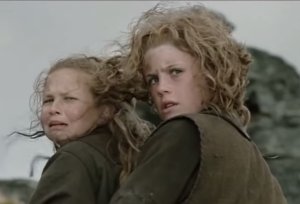Q: How Many Personal Names did Tolkien Devise for the Beornings?
 ANSWER: The short answer is two personal names: Beorn and Grimbeorn. But you would not be asking this question if you didn’t want a list of more names. I suppose we have to ask if you want a genealogy for the Beornings or if you want a list of names that would be appropriate for characters from among the Beornings.
ANSWER: The short answer is two personal names: Beorn and Grimbeorn. But you would not be asking this question if you didn’t want a list of more names. I suppose we have to ask if you want a genealogy for the Beornings or if you want a list of names that would be appropriate for characters from among the Beornings.
As far as a genealogy goes, there are no other canonical names. You are left with the need to devise your own. You can, of course, substitute some nicknames for given names, at least for two generations of Beorn’s family. You could use Beornfæder for Beorn’s father (not necessarily a chieftain over any men) and Grimsunu for a son of Grimbeorn (the son of Beorn). An alternate form for Grimsunu could be Grimbeornsunu. Some people may feel comfortable dropping the final “-u” from -sunu.
As for other names suitable for Beorning characters, it’s hard to justify any propositions for rules. But I would recommend against using anything at random. For example, any Old English (Anglo-Saxon) name starting with aethel- would denote nobility, which is probably not appropriate for Beorning society (at least not in the timeframe of, say, Third Age 2900-Fourth Age 100). Nor would you necessarily want to end a name with -ric, which denotes governance or rulership.
You might look at using simple names like Bald (“bold”), Bert, Beorht (“bright”), Dæg (“day”), Deor (“dear”), Eald (“old”), Frid,Fred (“peace”), Heard,Hard (“brave”, “hardy”), Helm (“defence, protection”), Leof (“love”), Milde (“mild”, “gentle”), Ræd (“counsel”, “advice”), Stan (“stone”), Weard (“guard”, “ward”), Win,Wine (“friend”), and Wulf (“wolf”). Old English Grim means “fierce” or “cruel” or “savage” or “dire”.
One rule you may want to consider is to reserve the element -beorn for descendants of Beorn himself.
You can also devise a rule about including or excluding name elements that are concerned with war (such as here, “army”). Names denoting battle, victory, slaying, death, and violence in general may not be all that popular among peaceful farmers; but if they are in constant conflict with creatures of evil they may choose frightening names for their children.
You could also sidestep the whole personal name issue by declaring all names to be nicknames earned in battle (or for some event in the character’s life).
# # #
Have you read our other Tolkien and Middle-earth Questions and Answers articles?
